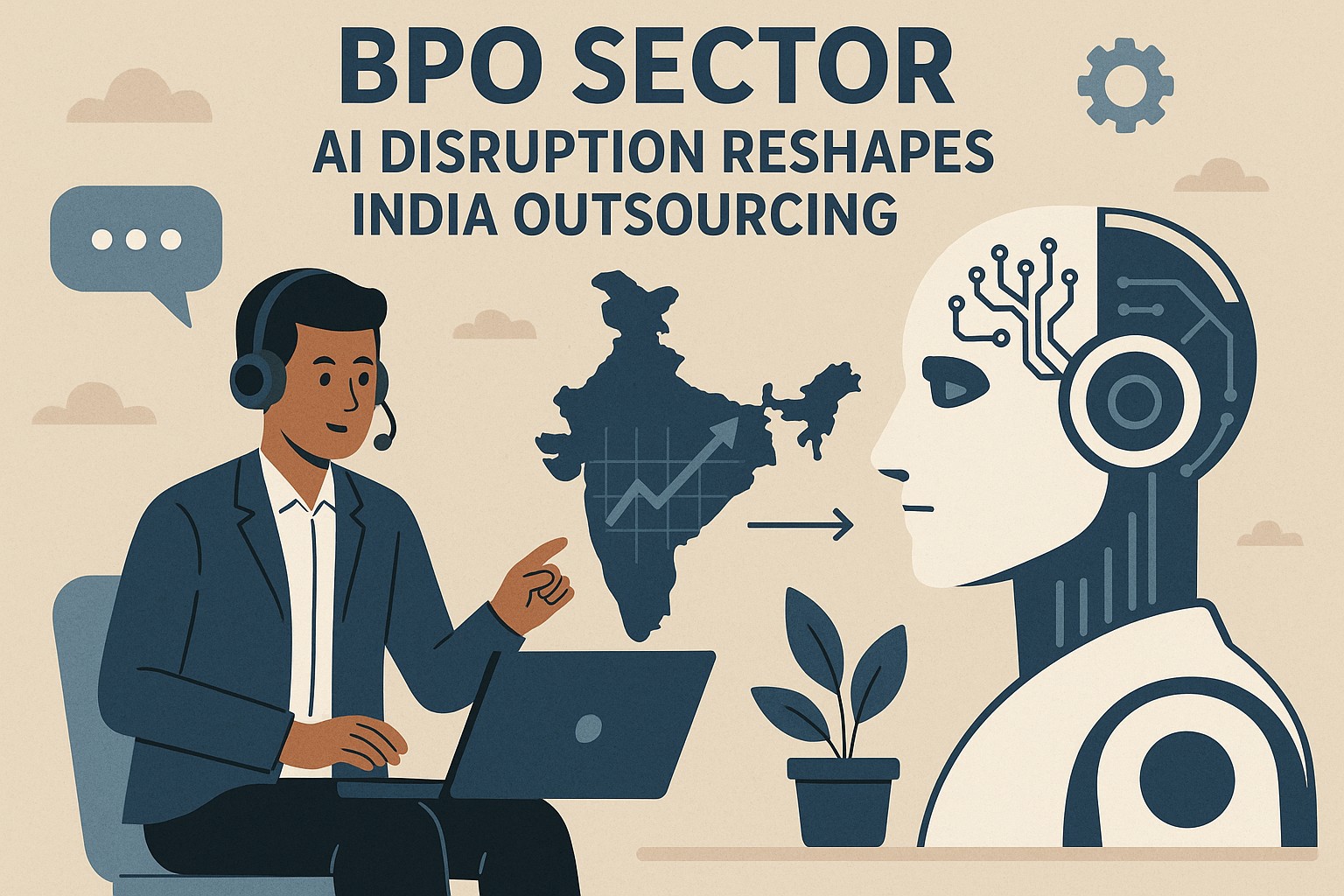BPO sector AI disruption is rapidly redefining India’s position as the world’s outsourcing powerhouse. As automation and artificial intelligence evolve, companies across the business process outsourcing landscape are making big investments to modernize and stay competitive. This transformation has reached a tipping point with Capgemini’s landmark $3.3 billion acquisition of WNS, a move that underscores how critical AI and SaaS have become in the sector’s future.
According to Moneycontrol, the Capgemini-WNS deal will strengthen sector-focused BPO services and enable faster adoption of AI-led delivery models. Meanwhile, TCS CEO K. Krithivasan recently warned that BPO sector AI disruption is inevitable, and companies must move quickly to adapt.
Why BPO sector AI disruption is accelerating in 2025
BPO sector AI disruption is not happening in isolation. Several powerful forces are driving this shift:
-
Generative AI advancements: AI models now handle tasks like claims processing, document classification, and intelligent customer service, reducing reliance on manual workflows.
-
SaaS-first delivery: Businesses increasingly demand subscription-based, cloud-native platforms over traditional outsourcing contracts.
-
Cost and efficiency pressures: Enterprises expect to save up to 30–35% on operations by combining AI with streamlined processes.
-
Sector expertise: Clients want BPO partners who understand specific industries like insurance, healthcare, and retail—not just generic processes.
As reported by Livemint, TCS believes the entire outsourcing model is about to be reshaped by this wave of automation.
How Capgemini’s acquisition signals BPO sector AI disruption
The Capgemini-WNS acquisition is one of India’s largest IT-BPO deals to date. Industry experts say it is an example of how BPO sector AI disruption is compelling firms to combine deep domain knowledge with technology platforms.
According to MSN, Capgemini gains access to WNS’s sector-specific expertise in healthcare, insurance, shipping, and travel—while building AI-powered solutions and SaaS services that clients now expect as standard.
This deal also sets a precedent for other players like Genpact, EXL, Infosys BPM, and Cognizant to pursue similar acquisitions blending vertical specialization with AI capabilities.
Specifications & Features of BPO sector AI disruption
Below are the key specifications and features shaping this shift:
-
$3.3 billion acquisition: Capgemini acquires WNS for domain-led BPO and AI delivery.
-
Core sectors impacted: Healthcare, insurance, banking, shipping, and travel.
-
Technologies driving disruption:
-
Generative AI for document automation and content creation
-
Machine learning for predictive analytics and fraud detection
-
SaaS platforms for workflow management and customer engagement
-
-
Cost benefits: Up to 35% reduction in operational expenses.
-
Talent transformation: Rising demand for AI oversight, prompt engineering, and data governance skills.
For a deeper analysis, refer to Moneycontrol and Livemint.
Implications of BPO sector AI disruption for companies and professionals
BPO sector AI disruption is reshaping expectations across the board:
-
For clients: Faster delivery, predictive analytics, and scalable SaaS solutions are becoming the new baseline.
-
For service providers: Investment in AI training, cloud platforms, and sector-specific capabilities is essential.
-
For employees: Traditional roles are evolving into higher-skilled positions involving AI supervision and process optimization.
TCS CEO Krithivasan noted that firms that fail to embrace AI will risk losing relevance as global clients demand smarter, automated services.
The future outlook for BPO sector AI disruption
BPO sector AI disruption is expected to accelerate over the next three to five years, with analysts predicting that as much as 60% of repetitive processes will be automated or AI-augmented.
While this presents clear challenges—especially around reskilling existing talent—it also unlocks enormous potential for India to lead the next phase of outsourcing innovation. Companies that quickly adapt to this shift can build sustainable growth models combining human expertise with advanced technology.
Looking ahead, the rise of BPO sector AI disruption signals an industry-wide transformation that will define how India maintains its leadership in global outsourcing. As firms embrace generative AI, SaaS platforms, and domain specialization, they will create a more resilient, efficient, and future-ready BPO ecosystem capable of meeting the evolving needs of clients worldwide.


